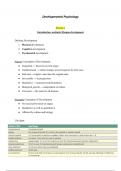Samenvatting
Summary including practice quizzes - Developmental Psychology (560028-B-6)
- Instelling
- Tilburg University (UVT)
This summary includes all notes from the lectures with some images from the lecture slides as well. I also included practice quizzes and answers. Good luck studying! :)
[Meer zien]




